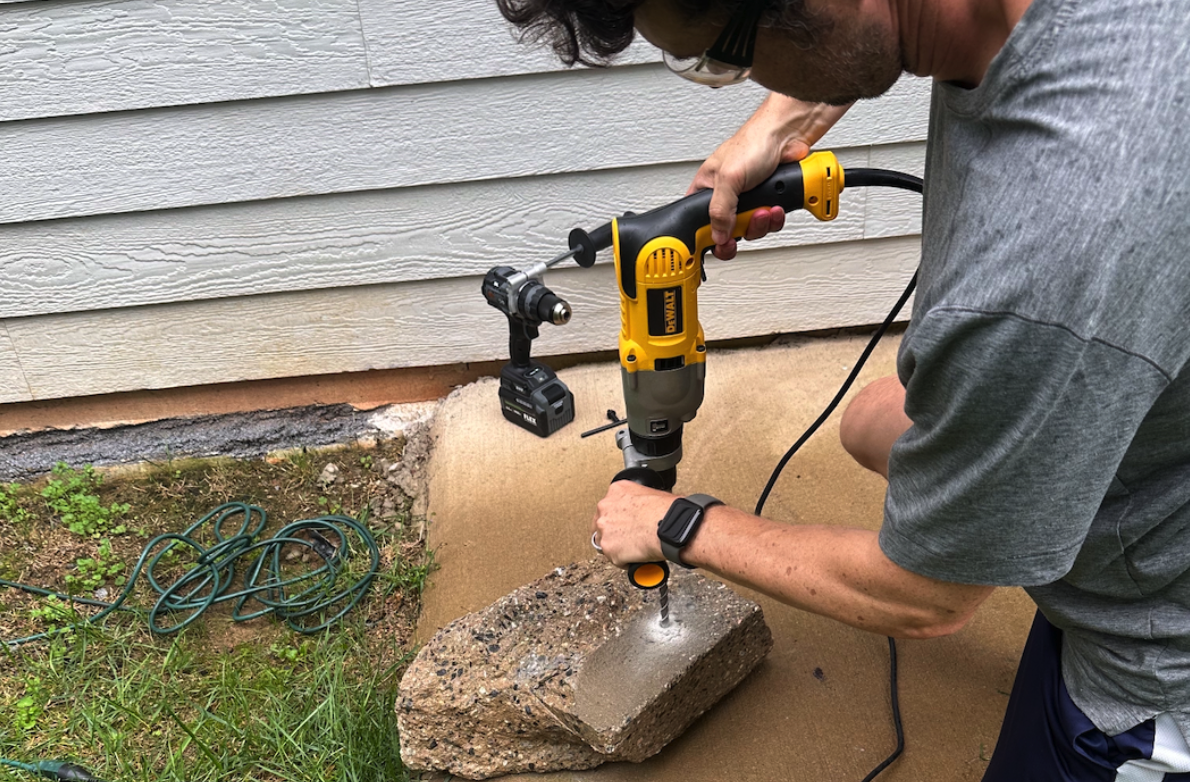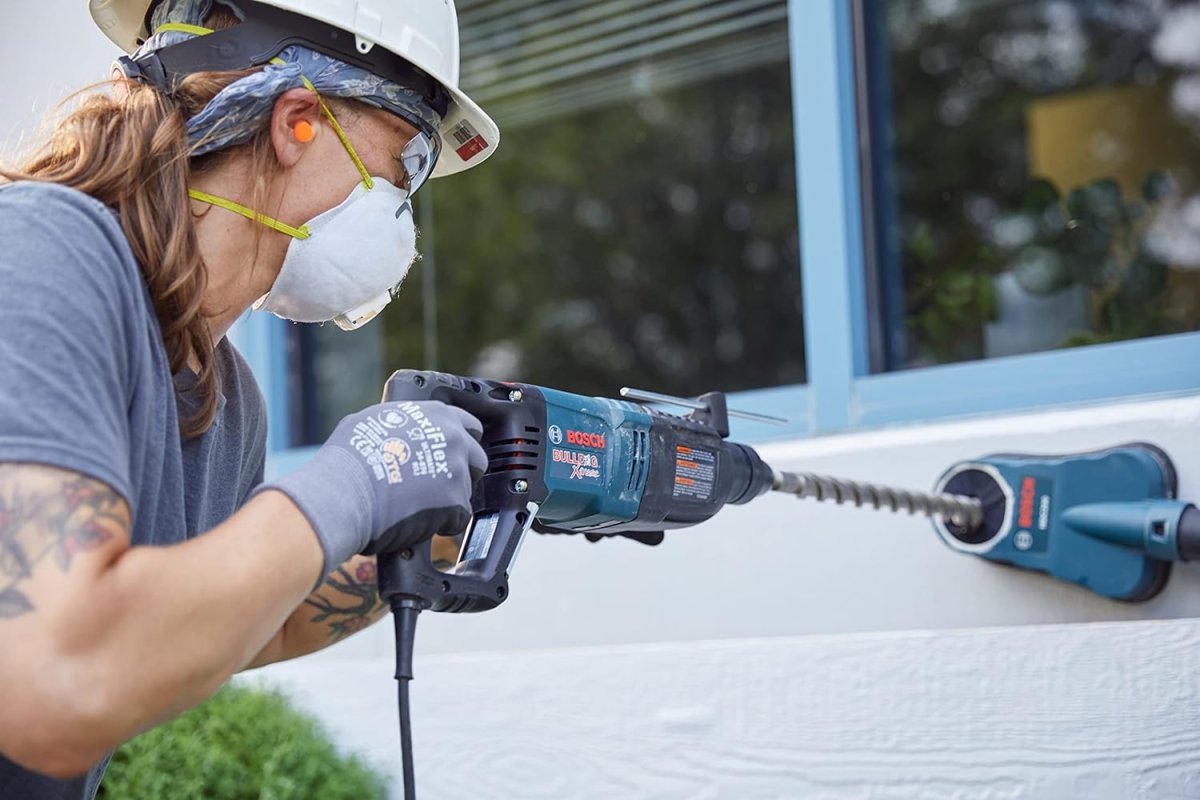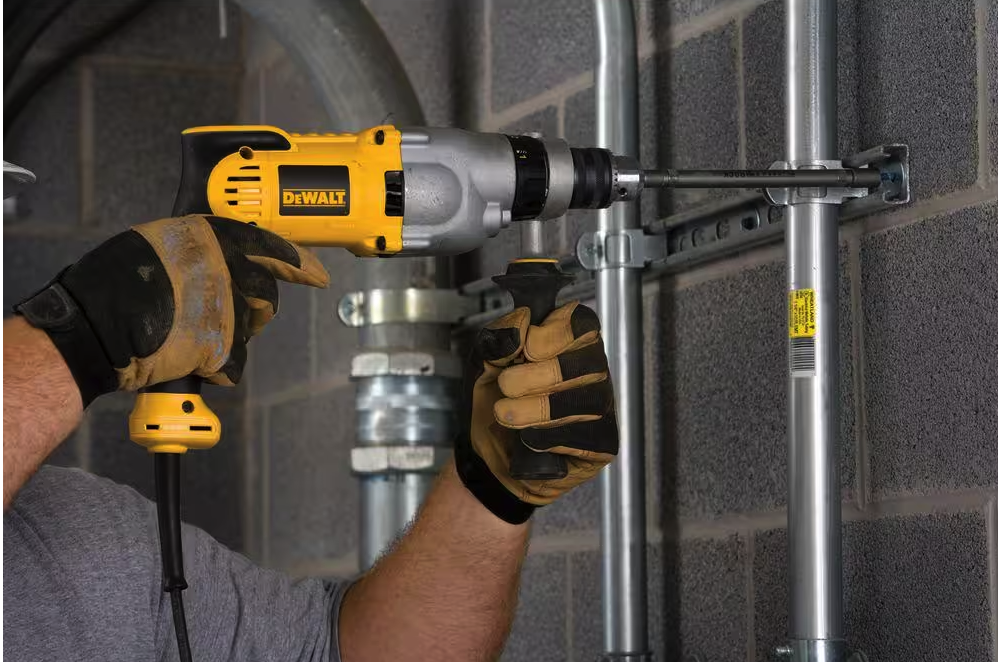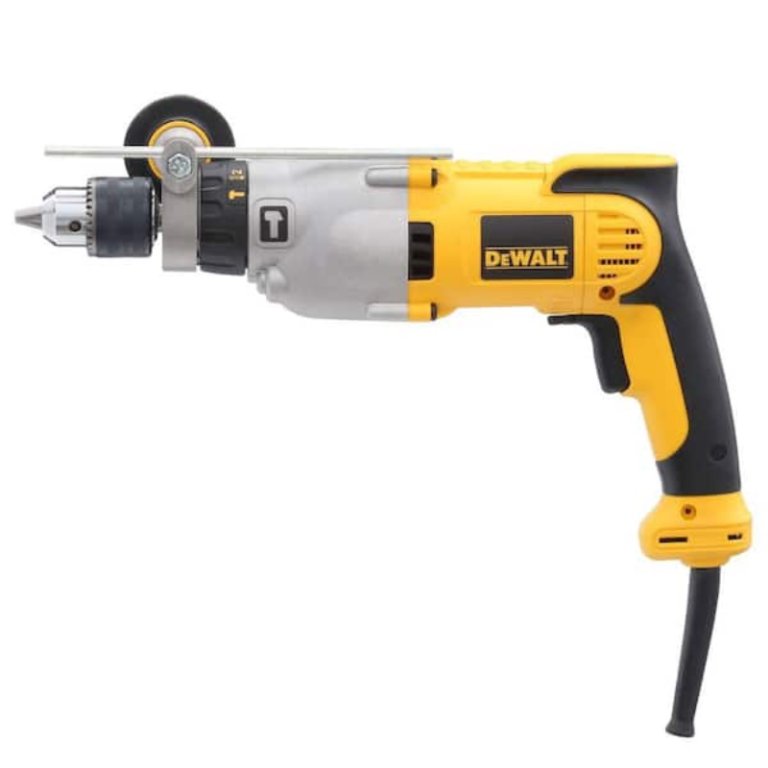We may earn revenue from the products available on this page and participate in affiliate programs. Learn More ›
Corded hammer drills can sometimes seem to belong to a category of tools that are a bit outdated. While it’s true that many lack high-tech motors, that’s largely because corded hammer drills simply do not need them. Whereas cordless tools rely on efficient motors that can eke the most out of their limited battery power, corded hammer drills boast simpler motors with long-proven reliability. They’re often more affordable as a result, and they never leave a project on hold while the battery charges.
In this article, we’ll examine a lineup that includes value-conscious and high-performance options. We’ll answer questions like, “Exactly what is a hammer drill?” and give advice on choosing the right model for both home and jobsite tasks. We also have a carefully curated selection of the best corded hammer drills on the market right now.
Best Overall
DeWalt ½-Inch VSR Pistol-Grip Hammer Drill
See ItPros
- Versatile all-rounder for home and professional use
- Drill-only mode for wood and steel
- Side handle for increased grip and control
Cons
- Brand name’s reputation comes with premium pricing
- Occasional reports of overheating
Specs
- Power 1,100 watts
- Maximum Speed 3,500 rpm
- Blows Per Minute (BPM) 56,000
The DeWalt pistol-grip hammer drill is a terrific all-around choice for most projects. It’s a go-to tool when you need higher performance for tough drilling tasks without the bulk and weight you usually get with a rotary hammer drill. It’s rated for up to 1½” diameter in wood, ¾” in masonry, and ½” in steel. It can run in high-speed, drill-only mode for wood and steel, and switch to low-speed and higher torque when you need a hammer drill for concrete or other masonry. The side handle adds control so you can drill with precision, and there’s an adjustable depth stop. The 10-amp motor has overload protection, which should prevent burnout should a drill bit get jammed—not an uncommon event when drilling in hard materials.
What our tester says: “The DeWalt power tools I’ve tested are usually the toughest, and this one was no exception with its all-metal chuck and gear case. If you have a project that requires drilling more than a couple of holes in masonry or making large holes in wood, this corded model is a great choice.” —Tony Carrick, Product Reviews tester and writer
Get the DeWalt corded hammer drill at Lowe’s or The Home Depot.
More Corded Hammer Drills Worth Your Money

These tools vary from budget-friendly, entry-level models to heavy-duty hammer drills that can tackle light demolition jobs. In fact, it’s not unusual to find a hammer drill set that includes the chisels necessary for this type of work. The following list of the best corded hammer drills demonstrates the wide variety available.
- Black+Decker Hammer Drill, available at Amazon or Lowe’s.
- Ryobi Variable Speed Hammer Drill, available at Amazon or The Home Depot.
- Eneacro SDS-Plus Rotary Hammer Drill, available at Amazon.
- Bosch Bulldog Xtreme Rotary Hammer Drill, available at Amazon, The Home Depot, or Acme Tools.
- Milwaukee SDS Rotary Hammer Drill, available at The Home Depot.
- Makita SDS-Max Rotary Hammer Drill, available at Amazon or The Home Depot.
How We Chose the Best Corded Hammer Drills
To ensure we had an overall view of the market, we drew on personal experience with corded drills and conducted extensive research. We looked at power output, speed, impact rate, and torque. Weight and manageability were also important, as was durability. The best hammer drill isn’t necessarily the one with the highest performance. For example, a hammer drill with drill bits can offer DIY users better value for the money even if the maximum speed is slightly lower than other models. As such, our curated roundup includes entry-level models as well as those that professionals might choose.
We also sought some professional advice. Corey Hinkel, Product Manager at Bosch Power Tools, suggested that “Before purchasing a corded hammer drill, it’s essential to consider factors like weight, required hole size, and impact energy. These key criteria will help in selecting the ideal tool for the specific job demands, including drilling, breaking, and chiseling concrete.”
What to Consider When Choosing a Corded Hammer Drill

The key aspects of choosing a hammer drill will depend on what you’re likely to use it for most of the time. For example, if you want to put up a few shelves in a cinder block garage wall, an entry-level hammer drill will do what a standard drill driver can’t and it won’t cost you a lot of money. On the other hand, if you’re going to be drilling holes in concrete all day long, you’ll want a corded rotary hammer. The following section explains the main differences.
Power
There are two ways to indicate the power of a corded drill: amps (A) or watts (W). In both cases, higher numbers indicate more power. Amps measure the strength of the electrical current used. Generally speaking, entry-level to light professional hammer drills use between 6 and 8 amps. More powerful heavy-duty models use between 10 and 14 amps. At the upper end of this range, you find tools that can also work as light demolition hammers. The maximum current allowed by an ordinary household socket is usually 15 amps, so 14 amps is seen as a maximum to prevent the tool from tripping breakers.
Watts are calculated by multiplying amps by volts. As most circuits are 120 volts, it’s easy to see that amps and watts are closely related. Entry-level hammer drills are probably in the 500 to 600 watt range, whereas heavy-duty models might reach 1,500 watts. Not all manufacturers provide the hammer drill’s wattage, and we found that even when they do, some retailer figures are inaccurate. As long as you remember that watts=amps x volts, you can calculate the true value yourself.
Speed
Budget-friendly hammer drills are often single-speed. It’s a compromise between the faster speeds generally used for wood and slower speeds that are better suited for drilling masonry. A switch is used to toggle between the standard drilling mode and the hammer action.
The same kind of switch is found on more powerful hammer drills, but these also have two speeds, so you have increased versatility when drilling in different materials. Another way to judge performance is to look at the maximum drilling capacities that some manufacturers provide or the size of the drill bit that can be used in the chuck. You might also want to check the type of chuck. Heavy-duty SDS, SDS Plus, and SDS Max hammer drills have a special engagement system and can’t use standard drill bits.
Impact Energy & Torque
Our expert, Corey Hinkel of Bosch Power Tools, mentioned the importance of impact energy, which is essentially the force of the hammer action. Manufacturers often provide related metrics, such as blows per minute (BPM) or impacts per minute (IPM). The higher the number, the more rapid the hammering; however, that doesn’t take into account the amount of force or weight behind the hammer action, and those would be needed to properly gauge impact energy. Unfortunately, the numbers are seldom provided, so in effect you have to make an educated guess. Combining BPM with tool weight gives a reasonable indication for comparison.
Torque can be defined as twisting power. It’s most often given as inch pounds (in-lbs) but occasionally as foot pounds (ft-lbs). Hammer drills usually boast considerably more torque than standard models, though again, figures may be hard to find.
FAQs
The article above provides plenty of information to help you understand the different ways a corded power drill can function. A look at the specifications of our top picks will allow you to refine your choice. During our research, we found a few questions related to performance that could affect how a drill would be used, so we have answered those questions here.
A corded hammer drill isn’t necessarily more powerful than a cordless hammer drill. However, as corded hammer drills are often cheaper than their cordless equivalent, you may be able to afford a more powerful model. Additionally, corded performance isn’t interrupted by the need to change batteries.
It depends on the type of work you need to do. The information provided in our ‘What to Consider’ section will help you assess your needs. Entry-level DIY models would be around 6 to 8 watts. Heavy-duty tools can offer up to 14 watts.
As watts are widely accepted as a way to measure how powerful a motor is, use the same standard you would to decide how powerful the drill should be: for heavy-duty jobs, look for a higher wattage (up to 14). For simpler, less-demanding jobs, an entry-level model of 6 to 8 watts should suffice.
Corded hammer drills may sometimes be seen as older technology, and budget models may be basic. The main disadvantage is that the cord can restrict freedom of movement, and even with a long extension, you need to be within about 100 feet of a power outlet.


